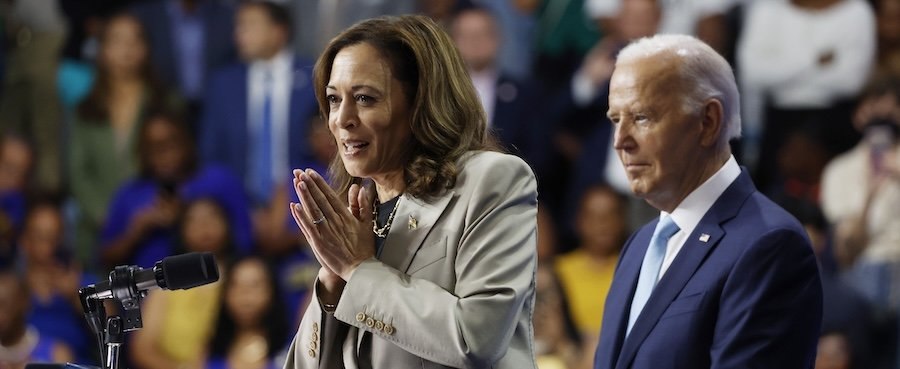Following Donald Trump’s defeat of Kamala Harris in the 2024 presidential election, some commentators have suggested that the Democratic ticket may have fared better if President Joe Biden had remained as the party’s candidate — he withdrew from the ticket in July — or if the party had selected someone else entirely. YouGov polled registered voters in the week following the election about how they voted — as well as how they would have voted if the Democratic nominee had been Biden, Michigan Gov. Gretchen Whitmer, or Pennsylvania Gov. Josh Shapiro. Our findings suggest that, despite Harris' loss, Americans were more likely to vote for Harris than they would have been to cast a vote for any of these alternatives.
In line with Harris' narrow loss in the national popular vote, the poll finds that 46% of registered voters cast a ballot for Harris while 48% voted for Trump. The remainder is made up of 2% who voted for another candidate and 5% who did not vote. Fewer voters said they would have voted for Biden (41%), Whitmer (38%), or Shapiro (37%) against Trump.
One wrinkle in comparing a hypothetical nominee to an actual one is that some voters are not sure how they would vote in a hypothetical scenario. Indeed, 4% of voters say they are not sure how they would vote if Biden had run against Trump, as do 9% in a Whitmer-Trump matchup and 10% when considering a Shapiro-Trump matchup. However, voters did not just move into the unsure column when asked what they would do if Biden remained the nominee. While 48% of voters cast a vote for Trump in his race against Harris, 50% say they would have voted for Trump in a race against Biden. This means that, even if Biden had won over all the unsure voters, he still would have lost to Trump by a wider margin than Harris did.
Trump fares slightly worse in hypothetical matchups with Whitmer and Shapiro. In a Whitmer vs. Trump matchup, 48% of voters say they would vote for Trump, the same as the share that say they did vote for Trump in the race against Harris. In a race between Trump and Shapiro, 44% of voters say they would vote for Trump, less than the share who voted for him against Harris, but still significantly higher than the 37% who say they would vote for Shapiro. In either hypothetical matchup, Whitmer or Shapiro would have to win over roughly 90% of undecided respondents in order to match Harris’ vote share — which still wasn't enough to win the popular vote.
The higher shares of Americans who are unsure about matchups featuring Whitmer and Shapiro likely reflect these candidates’ lower name recognition. For each of Trump, Harris, and Biden, less than 1% of Americans say they don't know if they have a favorable or unfavorable opinion and less than 10% have a neutral opinion. In contrast, attitudes towards Whitmer and Shapiro are less defined. 20% have a neutral opinion of Whitmer and 23% say they don’t know how they feel about her. Shapiro evokes even less of a response: 23% have a neutral opinion of him and 28% say they don’t know, meaning only about half of Americans have a positive or negative opinion of Shapiro.
Harris’ overperformance compared to alternative Democratic nominees can be seen across demographic groups. In fact, whether voters are divided by gender, race, age, education, or region, all groups are more likely to say they voted for Harris than to say they would have voted for Biden, Whitmer, or Shapiro. In fact, most groups say they would have been more likely to vote for Trump had Biden remained the nominee.
Within a week of Biden dropping out, YouGov polling found that Harris was garnering more support than Biden had been against Trump. These results suggest that her advantage over Biden persisted through Election Day — consistent with other YouGov polling just before and after Election Day — and that Americans did not have a clear preference for an alternative such as Whitmer or Shapiro over Harris.
While we can never know what would have happened if a different Democratic candidate had spent the last months of the 2024 race on the campaign trail, we can say that, knowing what they know now, Americans were more likely to favor Kamala Harris than any of Joe Biden, Gretchen Whitmer, or Josh Shapiro.
— Taylor Orth and Carl Bialik contributed to this article
See the results for this YouGov poll
Methodology: This survey was conducted between November 6 and 12, 2024, for the SAY24 project for Stanford, Arizona State, and Yale Universities. YouGov invited 10,036 U.S. adults to participate in this survey, chosen to be representative of the U.S. adult population; of these, 5,473 completed the survey. Registered voters were randomly sampled to answer questions about hypothetical presidential election matchups, with each matchup shown to 42% of respondents. The sample was weighted according to gender, age, race, education, and region based on the U.S. Census American Community Survey and the U.S. Census Current Population Survey, as well as 2020 and 2024 presidential vote and partisan identification. 2024 presidential vote at the time of weighting was estimated to be 48% Harris and 50% Trump. Weights range from 0.05 to 6.14, with a mean of 1 and a standard deviation of 1.14. The margin of error for a percentage based upon the entire sample is approximately 2 percentage points. The margin of error is larger for subsamples and differences of percentages.
Image: Getty












